Home » Achievements » Students (Page 2)
Category Archives: Students
Recent Posts
- Strengthening Industry Collaboration: CSE Hosts IAB Meeting for CS and CE Programs
- CSE Students Secure First Place at Snoonu Hackathon 2026
- CSE Faculties Receive Grants on Institutional Collaboration between Qatar University & Khalifa University
- Computer Engineering Practicum Demo Day & Contest (4th Edition)
- CSE faculty receives research funding from Google
Archives
- January 2026
- December 2025
- November 2025
- September 2025
- August 2025
- May 2025
- February 2025
- January 2025
- December 2024
- November 2024
- September 2024
- June 2024
- May 2024
- April 2024
- March 2024
- February 2024
- January 2024
- December 2023
- November 2023
- October 2023
- September 2023
- June 2023
- May 2023
- April 2023
- March 2023
- February 2023
- January 2023
- December 2022
- November 2022
- October 2022
- September 2022
- August 2022
- May 2022
- April 2022
- March 2022
- February 2022
- January 2022
- December 2021
- November 2021
- October 2021
- September 2021
- August 2021
- July 2021
- May 2021
- April 2021
- March 2021
- February 2021
- January 2021
- December 2020
- November 2020
- October 2020
- September 2020
- August 2020
Categories
CSE SDP Contest Day 2025
May 15, 2025 / Leave a comment
On May 6th 2025, the highly anticipated senior project presentations took place at the state-of-the-art new engineering building H07. These remarkable projects, the culmination of tireless efforts by talented students, were subjected to rigorous evaluation by examiners from the CSE department. After careful deliberation, outstanding projects from each program, Computer Science (CS) and Computer Engineering (CE), emerged victorious. Exceptional teams of those winners will be chosen to proudly represent our department in the upcoming college contest. We eagerly anticipate the success that awaits our representatives as they compete at the college level, confident in their abilities, to make our department proud once again.
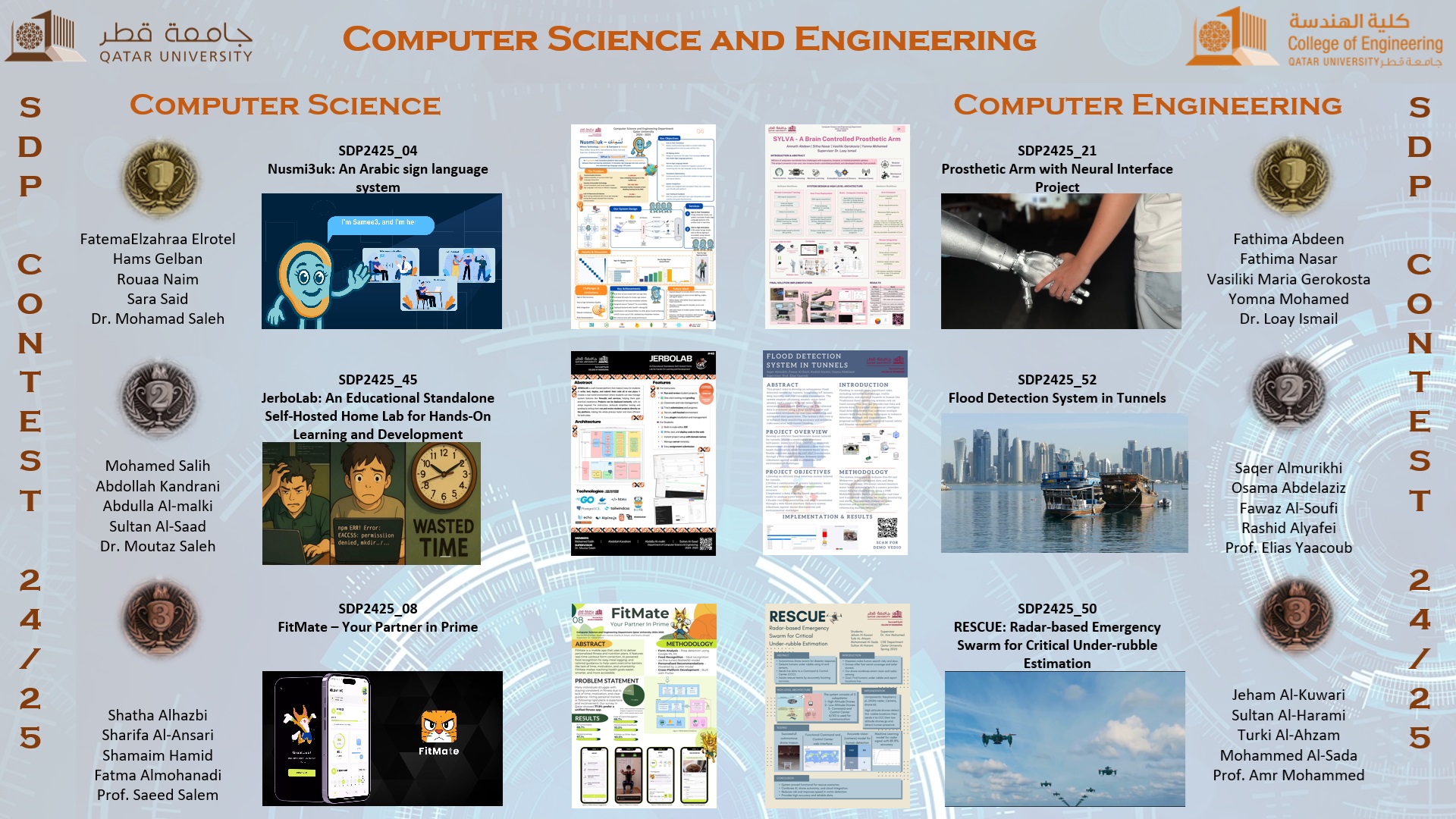
Winning Projects in CSE-SDP23 Contests Day
CE Rank 1
Project title: Prosthetic Arm with Neural Interface Project
Students: Fathima Amnath Abdeen, Fathima Sifna Nasar, Vasiliki Maria Gerokosta, and Yomna Mohamed.
Supervisor: Dr. Loay Ismail
CE Rank 2
Project title: Flood Detection System in Tunnels
Students: Saqer Almurikhi, Osama Abdelaziz, Fawaz Al-Soufi , and Rashid Alyafei
Supervisor: Prof. Elias Yaacoub.
CE Rank 3
Project title: RESCUE: Radar-based Emergency Swarm for Critical Under-rubble Estimation
Students: Jeham Al-Kuwari , Sultan Al-Harami, Turki Al-Ahzam , and Mohammed Al-Sada
Supervisor: Prof. Amr Mohammed
CS Rank 1
Project title: Nusmi3uk: An Arabic sign language system
Students: FatemaElzahraa Elrotel , Hams Gelban, Rouaa Naim, and Sara Said
Supervisor: Dr. Mohammad Saleh
CS Rank 2
Project title: JerboLab: An Educational Standalone Self-Hosted Home Lab for Hands-On Learning and Development
Students: Mohamed Salih, Abdollah Kandrani Abdulla Al-malki, and Sultan Al-Saad
Supervisor: Dr. Moutaz Saleh
CS Rank 3
Project title: FitMate – Your Partner in Prime”.
Students: Shatha Alhazbi , Sharifa Al-Ansari, Shamaim Hamid, and Fatma Almohanadi
Supervisor: Prof. Saeed Salem
CSE Team Shines at Innovators in Education with AI-Powered Project “Faheem”
A team from the Department of Computer Science and Engineering earned the first place at the “Innovators in Education” event, organized by the College of Education in partnership with the Colleges of Engineering and Business at Qatar University, and proudly sponsored by ExxonMobil.
The award-winning team, comprising Dr. Saleh Alhazbi and senior students Marwan Sayed and Osama Hardan, presented their groundbreaking project titled “Faheem: An AI-Powered Platform to Learn Coding.”
Faheem is a smart educational platform that transforms the way students learn programming by offering an engaging and personalized experience. It includes concise instructional videos, automatically generated quizzes, and an AI-powered chatbot that interacts with learners in natural language. The platform also provides hands-on coding exercises, step-by-step guidance, performance evaluation, and adaptive feedback tailored to each student’s level—creating a fully immersive and individualized learning journey.
Warm congratulations to the team on this remarkable accomplishment!


CSE team secured first place in Qatar Datathon 2025
February 25, 2025 / Leave a comment
A CSE team, that includes current students and graduates, won the first place in the Qatar Datathon 2025, organized by the National Planning Council (NPC) in collaboration with Microsoft in Qatar. The team included Sidi Chaikh (Computer Science Student / UI/UX / Frontend Developer), Mohaned Massoud (Computer Science Student / Frontend Developer), Osama Hardan (Computer Science Student / Data Scientist / AI/ML Engineer), Ahmed Ashraf (AI Software Architect), and Youssef Aly (Cybersecurity Researcher).
The Datathon was a highly competitive event in which 35 teams participated, working on real-world challenges using data-driven solutions. Participants were provided with datasets and tasked with developing innovative insights to address critical issues related to national planning and development. The event aimed to encourage the use of data science and AI to drive impactful solutions for urban planning, resource optimization, and economic development.
Their winning project, Insighty, is a data analytics platform designed to provide policymakers and organizations with intelligent insights from large datasets. It leverages machine learning and advanced visualization techniques to simplify complex data, enabling better decision-making in urban planning, resource allocation, and economic development. The platform aims to bridge the gap between raw data and actionable strategies, making data more accessible and impactful.
We are proud of you!

CSE Students Secure 2nd Place at CMU-Q Lifelines Hackathon 2025
February 24, 2025 / Leave a comment
CSE students from Qatar University has secured Second Place at the Lifelines Hackathon 2025, a three-week competition organized by students of Carnegie Mellon University in Qatar (CMU-Q) and sponsored by the Qatar Research, Development, and Innovation Council (QRDI). The team included Fatima Ahmed (Computer Science), Shada Ibrahim (Industrial Engineering, Minor in Computer Science), Ranya Merabet (Pharmacy), and Hala Subeh (Industrial Engineering, Minor in Computer Science).
The event started on 9th January 2025, and saw 63 teams from across Qatar that came together to develop cutting-edge solutions aimed at improving crisis management and emergency response.
Their proposed project, SalamTECH, is an advanced three-component system designed to streamline the triage process and enhance emergency communication. It integrates an AI-powered SOS alert system to assess patients in real-time, a live tracking feature for paramedics to optimize response efforts, and instant data access for emergency department staff to ensure seamless coordination. By enabling real-time data sharing, SalamTECH accelerates response times, minimizes miscommunication, and improves the accuracy of patient care, making it a game-changer in crisis management.
We are proud of you!
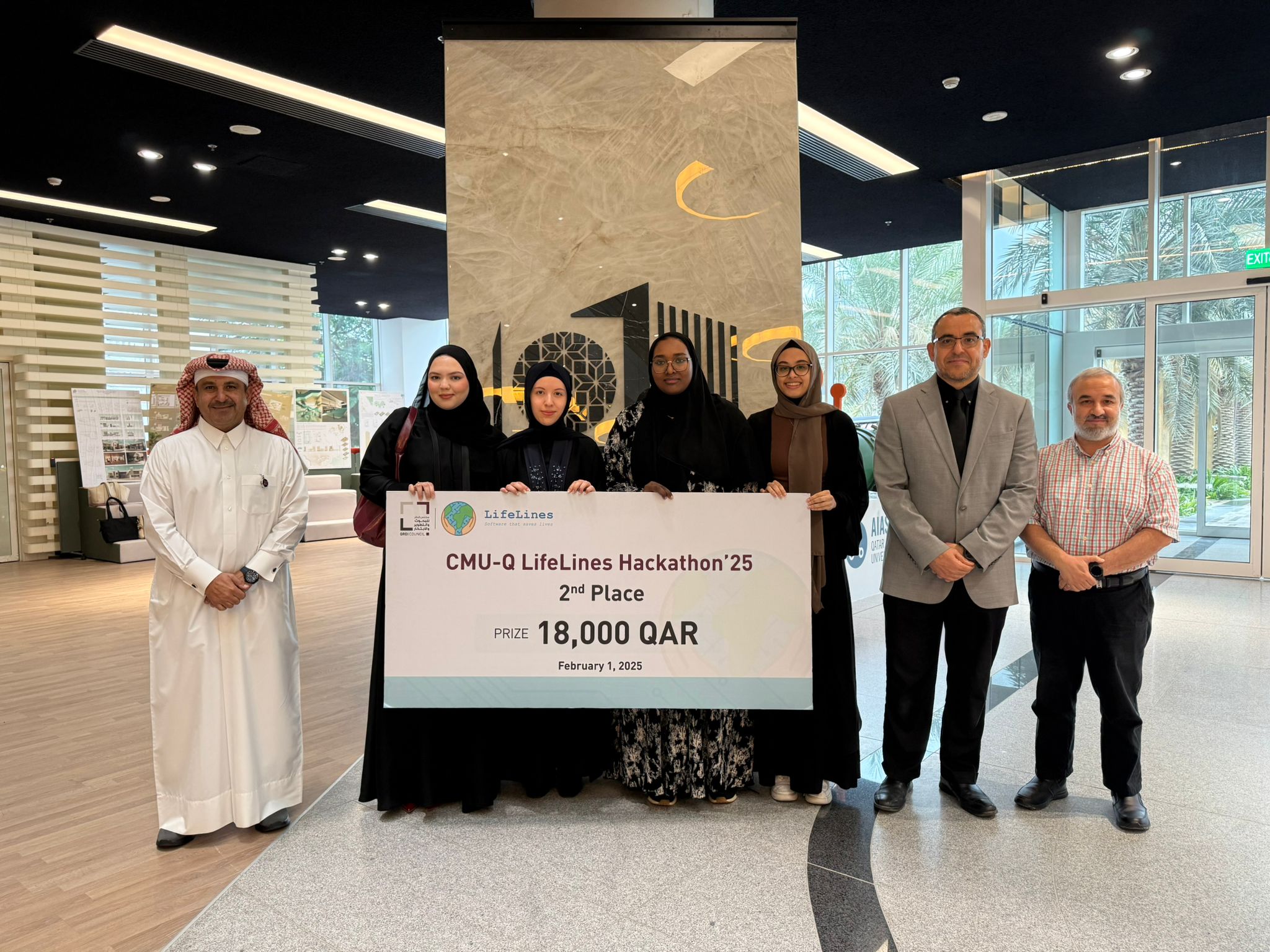
CSE faculties and students awarded at CENG 2024 End of Year event
June 2, 2024 / Leave a comment
The College of Engineering held its End of Year event on May 28, 2024, where several CSE faculty members and students were honored with awards.
The graduation projects competition of all engineering senior students was part of the CENG End of Year event. The competition included two categories: Best Project Design and Best Project Marketing Presentation. The first place in the Best Project Design category was awarded to the project titled “Vaultexe/OSS Zero-knowledge Self-hosting Password Manager” from the Computer Science program. This project was created by students Ahmed Abdou, Husam Snober, Mohammed Saqallah, and Walid Ben Ali, under the supervision of Dr. Moutaz Saleh.
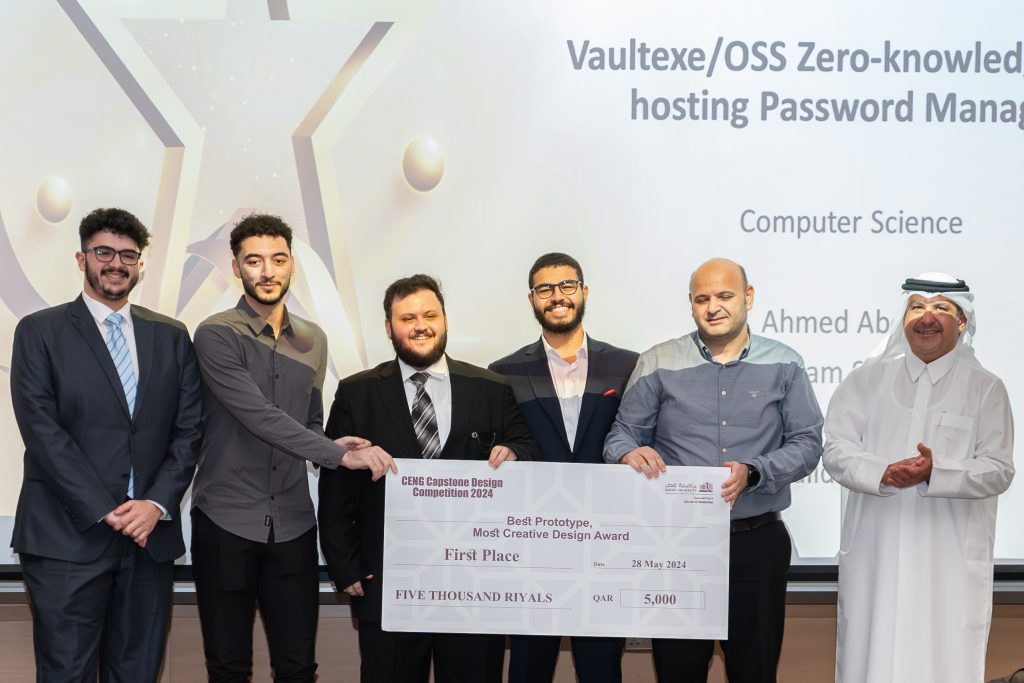
In the Best Project Marketing Presentation category, the third place was awarded to multidisciplinary graduation project titled “Q-SAR: Drone Swarm for Disaster Management”. The team included students Ali Yasser Ali Abdolwahab , Abdalla Mostafa Shaaban , and Assem Malek Alnajjar from Computer Engineering Program. Moslem Yaser A Al- Qawasmi, and Yaman Yasser Kutmawi from Computer Science Program, Khaled Abdelrazak Khaled, Khaled J L Barakah, Omar Hakam Ahmad, and Abdullah Khalid AL Mawed from Electrical Engineering Program. The project is supervised by Prof. Amr Mohamed, Dr. Wadha Labda, and Prof. Ahmed Massoud.
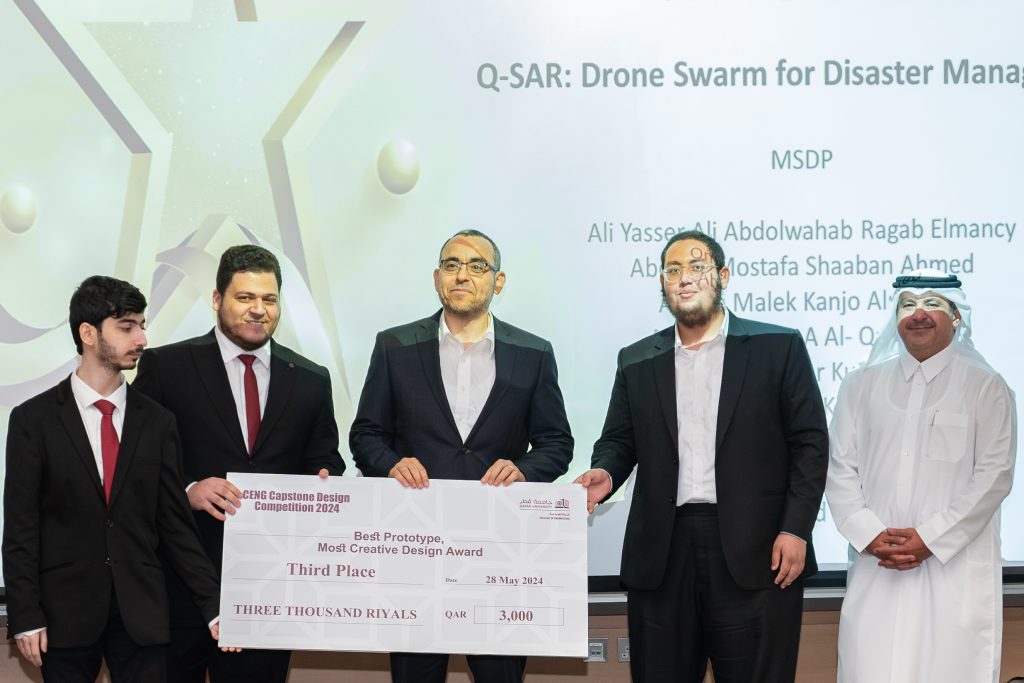
The Dean’s Awards for the academic year 2023-2024 were also presented. Prof. Junaid Qadir received the Dean’s Award for Research, and Dr. Saleh Al-Hazbi was honored with the Dean’s Award for Teaching. Additionally, Dr. Mohammed Saleh and Prof. Elias Yaacoub were recognized as internal judges for the Best Prototype and Most Creative Design competition.
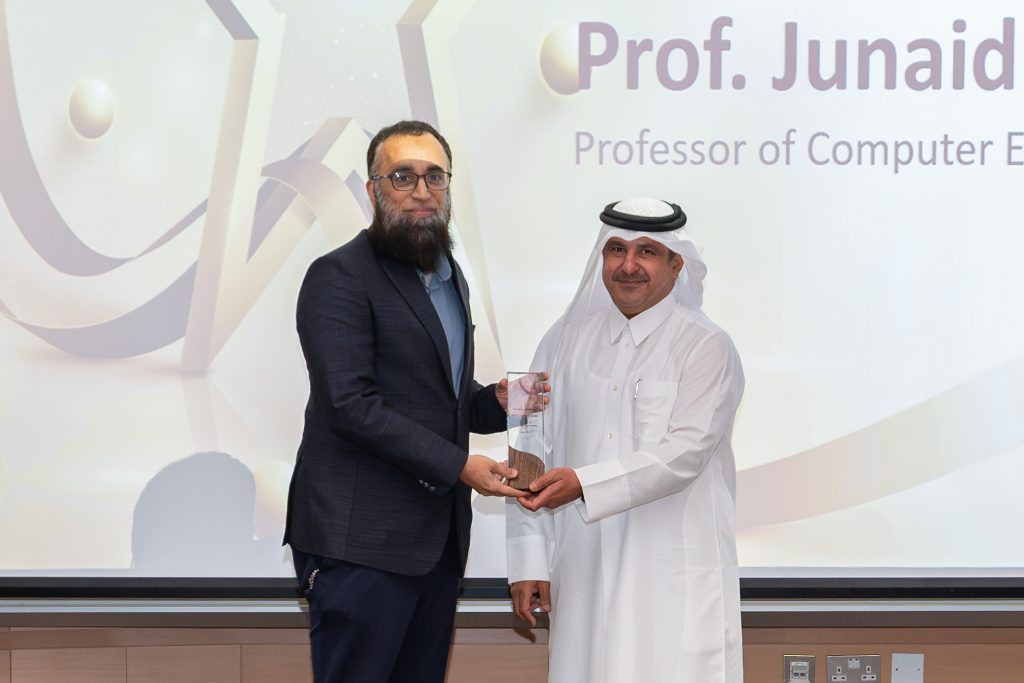
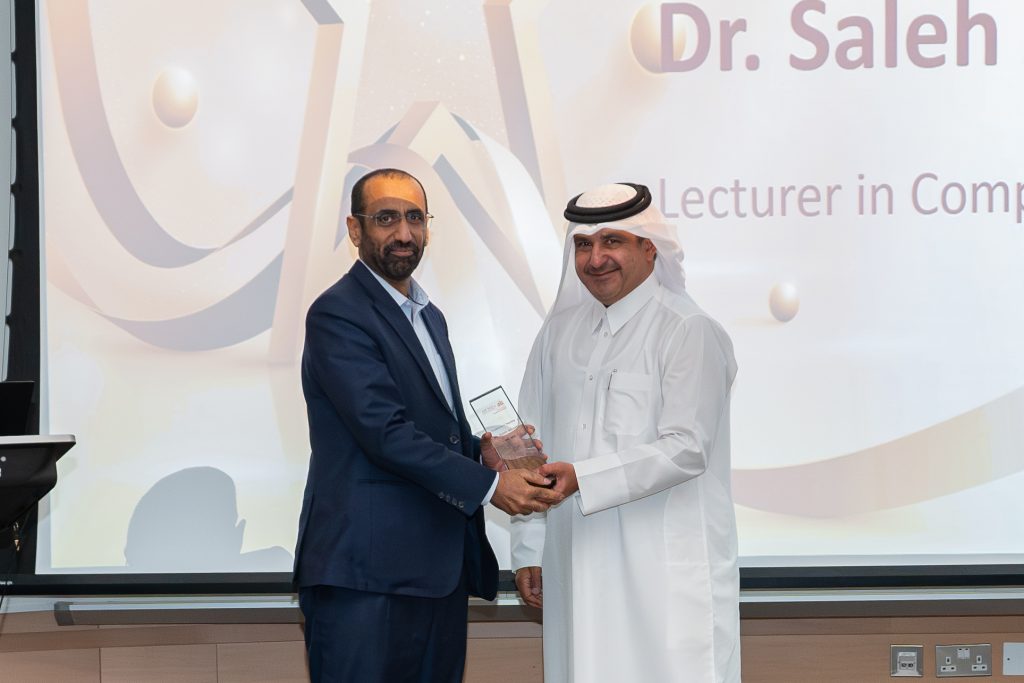
Lastly, Dr. Hazem Kemal was acknowledged by the College of Engineering for the completion of his tenure as a visiting professor in the CSE department.
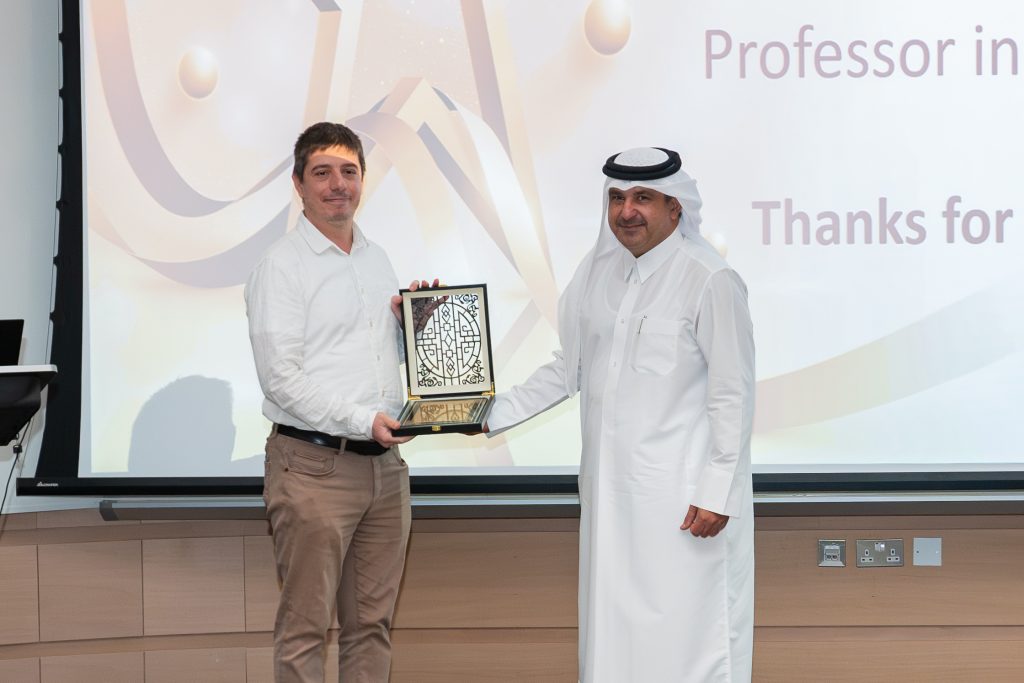
Congratulations to all of the awarded CSE students and faculties!
CSE SDP Contest Day 2024: All Winners
The highly anticipated senior projects’ presentations took place on May 6th at the state-of-the-art new engineering building H07. These remarkable projects, the culmination of tireless efforts by talented students, were subjected to rigorous evaluation by industry examiners. After careful deliberation, outstanding projects from each program, Computer Science (CS) and Computer Engineering (CE), emerged victorious. Exceptional teams of these winners will be chosen to proudly represent our department in the upcoming college contest. We eagerly anticipate the success that awaits our representatives as they compete at the college level, confident in their abilities, to make our department proud once again.

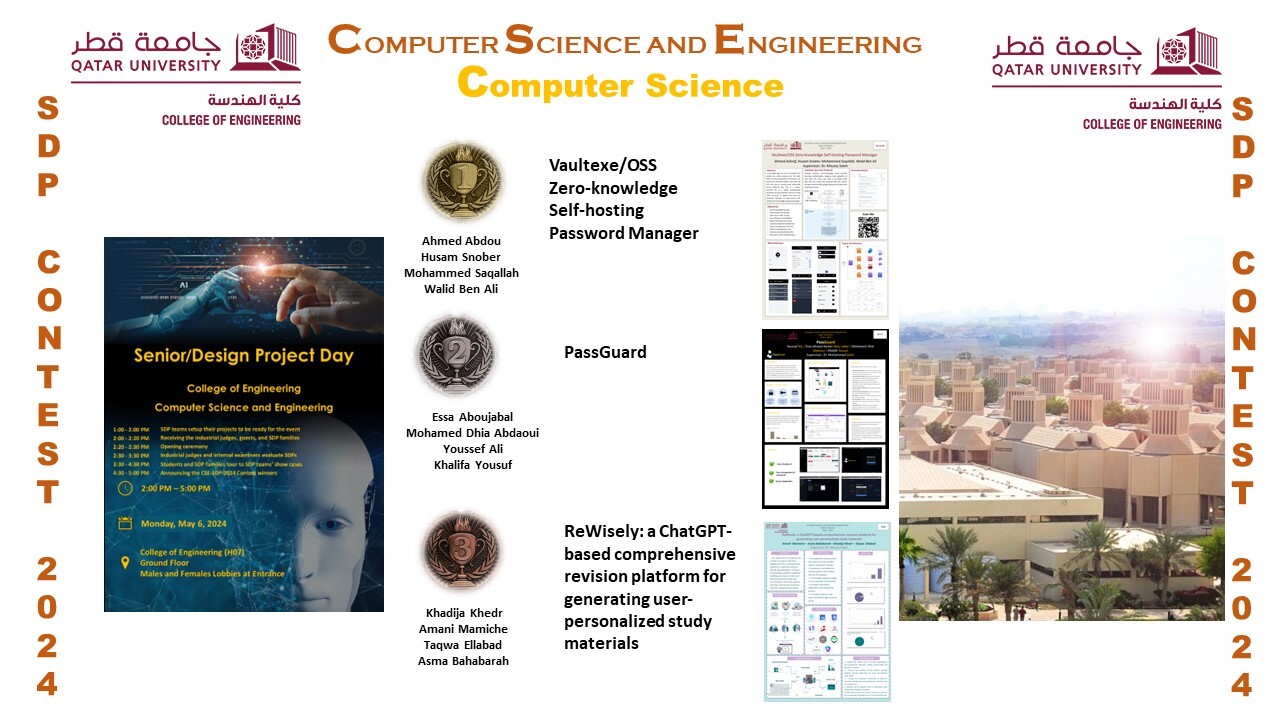
Winning Projects in CSE-SDP23 Contests Day
CE Rank 1
Project title: Q-SAR: Drone Swarm for Disaster Management
Students: Ali Elmancy, Abdalla Ahmed, Assem Alnajjar
Supervisor: Dr. Amr Mohamed
Abstract:
- SAR operations face difficult environments.
- Drones offer faster and more effective SAR missions.
- Design a drone system to enhance SAR missions.
- Radar sensors are used for under-rubble survivor detection.
- Leverage autonomous smart drones.
- Drone assembly and sensor integration.
- Design a wireless charging stations for drones.
- Develop a backend for ground control and monitoring.
CE Rank 1 (equally-ranked)
Project title: Marathon Monitoring System
Students: Aly Okasha, Mohammad Rayyan, Ibrahim koubeisi
Supervisor: Dr. Noora Fetais
Abstract:
The challenges in marathon organization, in particular participant safety and data collection. We’ve evolved a product to track participant positions, detect cheating, identify fainting, and easily transmit data to event administrators.
CE Rank 2
Project title: NABATEQ: Plant Health Monitoring System
Deep Learning Classification Approach
Students: Amro Moursi , Mohamed Tahar, Malek Hamad, Hamad Alansi
Supervisor: Dr. Uvais Qidwai
Abstract:
This project focuses on the development and implementation of an advanced plant health monitoring system. Our approach involves addressing the critical environmental factors essential for preserving plants’ well-being, including temperature, soil moisture, water levels, humidity, as well as the presence of essential nutrients like Nitrogen, Phosphorus, and Potassium.
Central to our methodology is the utilization of computer vision technology with Artificial Intelligence to provide health ranks for the plants under monitoring. By leveraging this data-driven approach, our system aims to provide precise and timely insights into the overall health and well-being of plants, offering a valuable tool for effective plant care and management.
CE Rank 3
Students: Abeer Madyar , Kawther Ahmed, Leen Alinsari, Razan Abdelgalil
Supervisor: Dr. Mohammed AlSada
CS Rank 1
Project title: Vaultexe/OSS Zero-knowledge Self-hosting Password Manager
Students: Ahmed Ashraf, Husam Snober, Mohammed Saqallah, Walid Ben Ali
Supervisor: Dr. Moutaz Saleh
Abstract:
In this digital age, we rely on passwords to protect our online presence on the web. With so many passwords to memorize, we experience password fatigue and easily fall into the trap of reusing weak passwords across different sites. This is a serious security risk, as a single compromised password can give attackers access to many other accounts. To address this issue, we introduce Vaultexe, an open-source self-hosted zero-knowledge password manager.
CS Rank 2
Project title: PassGuard
Students: Youssef Aly, Essa Ahmed Kamel Abou Jabal, Mohamed-Dhia Abdaoui, Khalifa Yousuf
Supervisor: Dr. Mohammad Saleh
Abstract:
The importance of a password in today’s world cannot be overstated. Unfortunately, a large number of people falls victim to data breaches because of their reliance on weak passwords, default passwords, reused passwords. It can be explained by a simple reason: it is more convenient for the general public to use predictable passwords and reuse them.
Here comes PassGuard, an offline password manager application, whose sole purpose is to provide password security and user convenience.
CS Rank 3
Project title: ReWisely: a ChatGPT-based comprehensive revision platform for generating user-personalized study materials
Students: Amani Mamiche, Asma Bahabarah, Khadija Khedr, Taqwa Ellabad
Supervisor:Dr. Moutaz Saleh
Abstract:
Our project aims to modernize the creation of revision material by integrating AI into a comprehensive, interactive, customized, and user-friendly web application. It focuses on developing a platform capable of handling vast amounts of data and offering assistance through text summarization, flashcards, question extraction, the Feynman technique, and mind-mapping functionalities.
